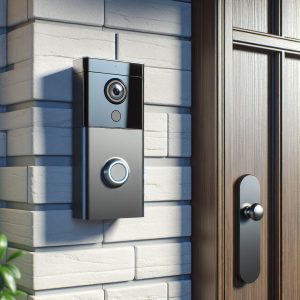1. What is CCTV?
CCTV stands for Closed Circuit Television; it refers to one or more cameras linked to a monitoring point and/or recording device, also it is a video system that consists of strategically placed video cameras around an area that records footage and is then transmitted to a display monitor for real-time viewing as well as footage playback. Primarily for surveillance and security purposes.
History: The First CCTV system was invented by Walter Bruch, a German electrical engineer in 1942.
2. How Does CCTV work?
CCTV consists of Security Cameras(Analog or Digital Camera), Cables(RJ45 or RJ59), Video Recorders(DVR or NVR), Storage Unit(HDD or Hard Disk), Display Unit/Monitor.
Security camera captures the video of the source. An opened aperture at the front of the camera captures light stream through the camera lens. The light stream is captured by a digital chip that is fitted inside the camera and is converted into the continuous stream of images. The camera records the signal to be transmitted either through cables or wirelessly. The distance between the camera and the object is determined by the camera lens specifications.
The cables are just the wires that are used to connect different equipments like CCTV camera, monitor, recorders, modem etc. in a CCTV camera setup. For CCTV cameras, the cables used are either RJ45 or RJ59 cables. These cables, if RJ59, may include BNC connectors to connect camera to video output (such as Monitor), power connectors etc. As for a RJ45 cable is most frequently used in CCTV camera setup.
When a CCTV camera sends video signals that might be useful at a later date it must be documented somewhere. There are two main types of recorders namely digital and analog recorders. Nowadays, Digital Video Recorders (DVRs) or Network Video Recorders (NVRs) are used to record CCTV camera footage.
The Hard disk is a storage device which stores the video captured by the security camera so that it can be used later. These CCTV hard disks are fitted within the video recorders. To view the video recordings on the hard disk, you can directly connect the DVR or NVR to monitor.
The display unit, or a monitor, takes the video image from DVR, or NVR and outputs it on the screen. You can see the video or image on screen that is been captured by the camera. The monitor can be a monochrome screen or a colored screen. Nowadays, High Definition (HD) colored LED monitors are quite commonly used to watch the videos.
A sequence of images is picked up on by the camera, which is transmitted as a signal that passes on to recording device and display device. The camera itself captures the video source. At the front of the camera is an opened aperture, and this is what captures the light stream through the lens. The light stream is captured by a digital chip inside the camera and turned into a sequence of images. This camera records this sequence of image and transmits either by cable or wirelessly.
3. What is CCTV used for?
CCTV can be used to monitor both public and property security. CCTV systems are primarily used for security, monitoring and surveillance purposes. For monitoring and surveillance purposes, CCTV can be used to for investigation or crime prevention.
4. Why is it important to have CCTV?
CCTV is important because it can deter crime, it can be used as evidence, and therefore acts as a force of law enforcement, it can monitor employers and encourage greater work productivity. It can also lower costs by preventing burglary and it can be used for the safety of others, e.g. helping track lost people, monitoring workers operating in dangerous conditions.
5. Do security cameras use a lot of electricity?
Security cameras use on average between 4 to 6 watts a day.
6. Can CCTV work without Internet?
Yes, providing that the CCTV camera has a means of transmitting a signal to the DVR or NVR, it can work without an internet connection.
7. How much does it cost to have CCTV installed?
This varies according to the number of CCTV units installed, and the type of CCTV installed. For more information, kindly visit https://garrisonalarms.co.nz/
8. How much does it cost to run a CCTV?
Depending on system type and number of cameras it can vary based on domestic or very large commercial systems.
9. What are the benefits?
CCTV monitoring offers a multitude of benefits to businesses, large and small. These include an active deterrent to intrusion & vandalism, low cost 24/7 security, reduces security costs & the reliance on guards, 24/7 continuous monitored surveillance, fast response to incidents, real-time threat detection, improved situational awareness, better overall site security, minimizing false alarms, peace of mind for homeowners or business owners.
10. How can CCTV prevent crime?
CCTV systems can prevent crime as they are a deterrent to would-be criminals as video images increase the risk of being identified and prosecuted. The latest CCTV cameras have smart features such as white light and auto person tracking – which both increase the deterrent factor of a camera.
11. Do I need a CCTV sign?
If you have a CCTV installed at commercial property or public building, you are required to install appropriate signage. Data protection rules do not apply if you install a camera on your own home to protect it from burglary.
12. Can you put CCTV in the workplace?
Yes, providing the employees are aware of it. There is no law which states that surveillance cannot be used within the workplace.
13. Does CCTV operate in low light environment?
Yes, all CCTV are fitted with night vision capabilities. Once the camera senses that the area is dark, night vision mode will be activated, helping users to be able to view the area even in complete darkness.
14. How many CCTV cameras do I need?
This will depend on your desired level of protection and the size of your property. If you’d like to keep your entire building secure, then a full CCTV security system with an integrated intruder alarm would be best.
15. Are CCTV cameras worth it?
Yes – installing CCTV cameras is worth it when used correctly and proportionately. CCTV systems are very good at detecting incidents and deterring crime. Used in conjunction with physical security systems, a CCTV system can significantly improve the security of an area.
Kindly visit https://garrisonalarms.co.nz/ to request a quote.





